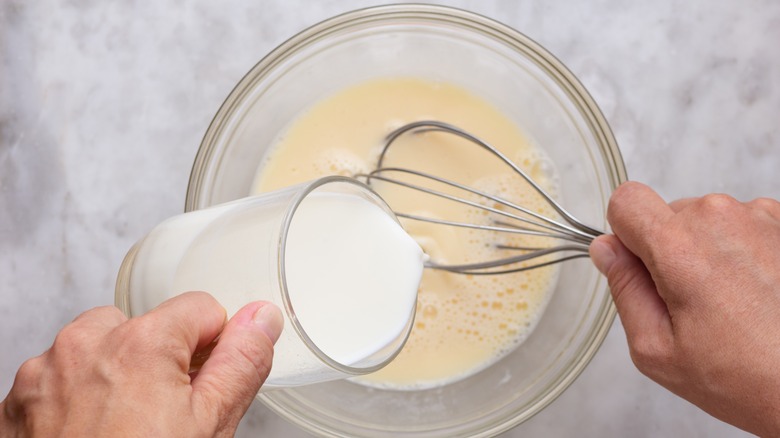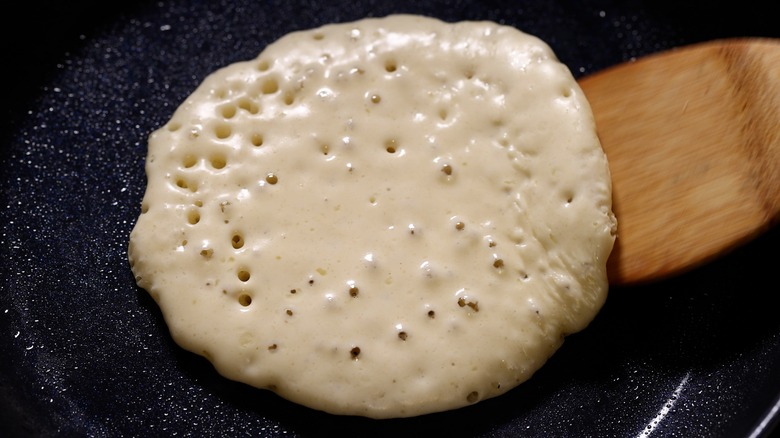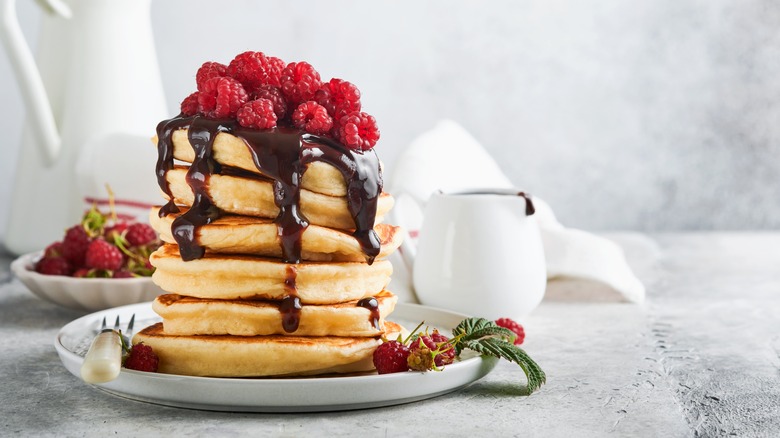Why You Need To Rest Pancake Batter For The Fluffiest Stacks
Who doesn't love a fluffy stack of pancakes first thing in the morning, or any time of day for that matter? The classic comfort food isn't quite so comforting, though, when they're thin, chewy, and dense. To make the best pancakes, using tried and true techniques while you're prepping and cooking is just as important as following a good pancake recipe.
To make the fluffiest pancakes, it's imperative to let the batter rest. This is an extra step that may mean getting up a little bit earlier, but maybe it's also the universe's way of telling you to sit down and rest a bit, too. After you whip up your batter, sit down and read a book or drink a hot cup of coffee before you pour it onto the hot buttered griddle. While your batter rests, it will form air bubbles that give the best pancakes their light and fluffy texture.
Letting the pancake batter rest gives it time to develop
By letting your pancake batter rest before you start to cook it, you give the batter time to do its work. First, it gives the flour a chance to absorb the liquid in your recipe. Often, pancake batter is a bit lumpy, especially if you follow best practices and don't overmix your batter. But as the batter rests, the lumps of flour absorb liquid, which results in the smooth texture you're looking for.
Second, allowing the batter to rest gives your leavening agent (typically baking soda or baking powder) time to do its work, forming air bubbles that will eventually translate to light and fluffy pancakes. As your leavening agent reacts with the other ingredients in your recipe, it releases carbon dioxide, which allows your batter to rise. Ideally, you'll be able to let your batter rest for 30 minutes before you start putting your pancakes on the pan or griddle. As your batter rests, you'll probably even see the bubbles form.
Other techniques to make pancakes fluffy
Letting your batter rest isn't the only way to make the fluffiest pancakes. You should also be careful not to overwork your batter after it has rested. Overmixing is a surefire way to take the fluff right back out of your pancakes. It can deflate those valuable air bubbles and overdevelop the gluten in your recipe. While overmixed pancakes might still taste good, they'll be a bit chewy and dense.
The ingredients in your recipe can play a huge role as well. Remember these tips the next time you're making pancakes. First, use buttermilk instead of milk or water since it contains acid which will react more strongly with the baking soda in your recipe creating more lift. You should also limit add-ins like chocolate chips and blueberries as they'll make your batter heavy; make them toppings instead. Finally, consider using cake flour instead of all-purpose flour; it has a lower gluten content, which creates a lighter, fluffier crumb. It's also important to make sure your leavening agent is fresh. If your baking soda or baking powder is old and no longer working the way it should, your batter won't rise, and you'll be left with less-than-ideal pancakes.
If you don't follow these tips, your pancakes will still be tasty; isn't any kind of pancake a good pancake? But if you start your pancakes with the right ingredients gently mixed into a batter that you let rest, you'll have the fluffiest, lightest pancakes possible.


